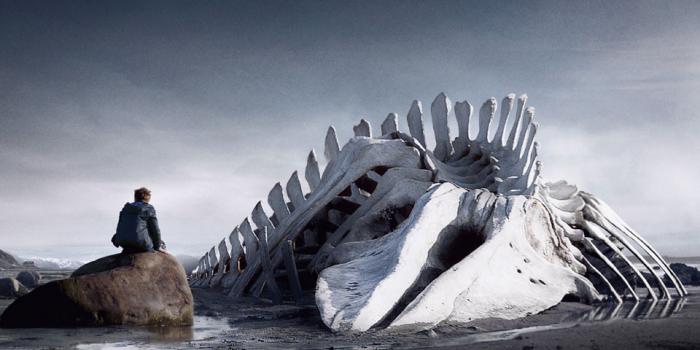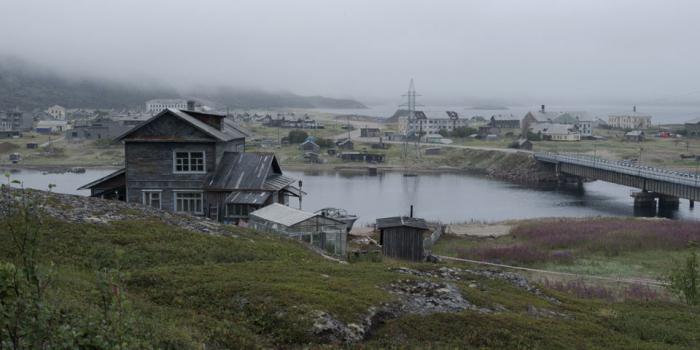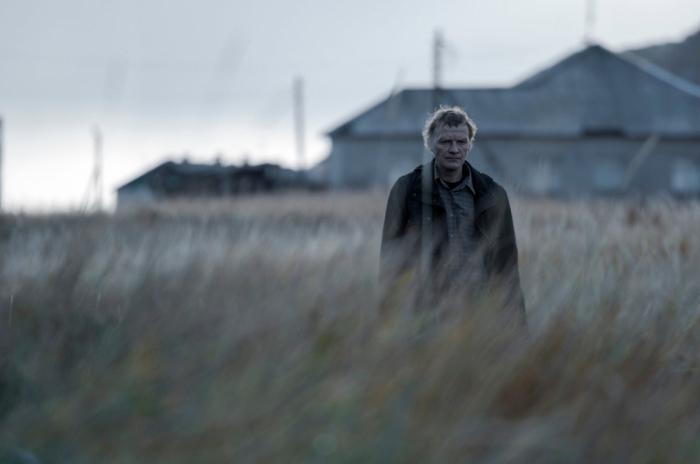The recently released film "Leviathan", according to many critics, is one of the most important film achievements of Russia over the past few years. As you know, it was this Russian film that was recently awarded the Golden Globe Award and received many more prestigious awards, for example, the prize for best screenplay, best male and female roles, editing, etc. Strangely enough, the picture was more fond of the Western viewer than domestic, which is clearly reflected in numerous critical articles.
First storyline
According to the director himself, in his film he sought to prove that biblical subjects can exist outside of time and space. In order to realize his idea, Andrei Zvyagintsev unfolds one of them in front of his viewer. The action takes place today in the Russian outback. The name of the film itself has many meanings, and it is associated not only with the Bible, which allows us to judge the multi-level storyline. The director was always famous for his deep work, after watching which the topic for discussion always appeared. The plot of the film “Leviathan”, in its deepest sense, is connected with the biblical story of Job, which describes a monster that embodies all the forces of nature that oppose man. The prototype of this hero is the main character of the film - Nikolai, who was brilliantly played by Alexei Serebryakov. He works honestly, loves his family, in a word, leads a quiet, quiet life in a house near the Barents Sea, built by his great-grandfather. Nicholas considers himself an exemplary Christian, and therefore is confident that God is favorable to him. However, as in the story of Job, the Almighty has his own plans for this person. A series of troubles and misfortunes falls on the head of the hero. Nicholas will have to review God's promise and accept it not as punishment, but as a test, to get rid of sinful pride and not make meaningless attempts to unravel God's purpose.

Second storyline
As mentioned above, “Leviathan” (film) is not a retelling of the story of Job, it is a multi-level work of cinematic art. At the next semantic level, the viewer has to solve new puzzles. Here the name Leviathan takes on a new meaning. This is no longer a natural monster that suppresses man - it is the image of the machine of our state, which, in the process of grinding the human mass, is not able to recognize a person. “Leviathan” is a film whose contents clearly demonstrate to the viewer how this machine works. The local government, representing the state, brutally destroys Nicholas as an individual, who ventured to defend his own rights to the land, originally owned by his father and grandfather.
What was the impetus for the birth of the plot?
At a Cannes press conference, Andrei Zvyagintsev said that he was prompted by the famous story of a Colorado resident in 2004 when he destroyed several administrative buildings with a bulldozer, thereby expressing his dissatisfaction with authorities who refused to recognize the rights of this person. The director noted that this could happen in any country, and added that only by transferring the plot to the domestic soil, he realized the existence of a proto-plot - the story of Job.
Movie characters
Numerous negative reviews about the film “Leviathan” are connected precisely with the fact that there is not a single positive character in the film. All characters regularly drink alcohol, constantly smoke and swear. The director himself sees in all this the “core” of the life of a simple Russian person, but many viewers perceived this as an insult, as an attempt to slander the Russians in the eyes of the rest of the “civilized” world. In light of recent events, the view that Leviathan is a film commissioned by the West is particularly relevant. The Western world really reacted to the picture better than domestic viewers. Perhaps this is due precisely to the images of the heroes, because they only confirm the long-established stereotype, they say, if Russian, then be sure a gloomy swearing drunk.
Gloomy landscapes
From the very first frames of the film we see Russia in exceptionally gloomy tones, fanned with hopelessness, as if by some kind of fog. The sad morning landscape of the old Murmansk town, where Leviathan was shot, really reminds Western films about Russia, which are mostly shot in Eastern Europe. However, everything is much more straightforward here. The picture did not promise its viewer bright colors, only a gloomy city mired in longing and hopelessness. Of course, in real life, where there are no cameras and director’s intentions, everything is different. The film was shot in a practically abandoned village of the Murmansk region, in Teriberka. For this region of Russia, such places are more likely exotic than routine. The locals themselves say that in reality their land does not look at all as flawed as it is presented in the film. However, as you know, in art there are no half-tones, it is simply unprofitable. Therefore, the terrain itself and the moral character of the inhabitants of the town where the “Leviathan” is filmed are shown in the picture exclusively from a gloomy side. Zvyagintsev only demonstrates what is disgusting: old rotting ships, broken dirt roads and a whale skeleton ... There is terrible dust everywhere, gray tattered walls of buildings, and people are dressed like beggarly refugees of the Civil War in Tajikistan of the 90s. Everyone who has visited Murmansk at least once knows for sure how beautiful this northern region is, therefore reviews of the film “Leviathan” are full of comments that the director distorts the real picture of reality. There were those who supported the idea of Zvyagintsev. According to the latter, there is nothing wrong with the fact that the general picture of the area looks slightly exaggerated. The most important thing is to convey the idea, and it is much easier to do it when it is expressed clearly.

Is Teriberka so bad?
Yes, a lot of rumors and gossip caused the picture "Leviathan" Zvyagintsev. Where you shot this film, you already know. With the release of the picture on world screens, many were simply stunned: are they really that bad in Russia? Many correspondents of foreign newspapers and television channels went to the village, where the film was shot, in order to see with their own eyes what was happening here. Teriberka became a real symbol of the decline of the North of Russia, which, in fact, confirms the plot of the film "Leviathan". In fact, everything is not so bad here. At one time, Teriberka was considered a district center, it was an urban-type settlement, rapidly increasing in size. However, in the early 60s, all major activity moved to Severomorsk, due to which the village gradually began to decline. The village head, Tatyana Trubilina, accuses Zvyagintsev of “Leviathan”: “Where was all this horror, poverty and unemployment filmed?” According to her, only 10% of the entire population of the village are unemployed; there is a wonderful house of culture, a library is functioning, equipped with computers and other necessary equipment. The chapter also recalls the merits of the Teriber folk choir. Of course, Zvyagintsev had no intention of insulting the village where Leviathan and its inhabitants were shot. Do not forget that the cinema is designed to reflect reality through a magnifying glass, exaggerating some details, and the director only seeks to most clearly identify the problems of the Russian hinterland.
Total devastation in the interiors of the film
The main character of the film Nikolai lives with his family in an old, battered house. To make the plot even more dramatic, the director focuses on the fact that the family of the hero does not live, but literally survives. The interior of the house where Leviathan is shot is full of elements of poverty. Everything that has accumulated in the old warehouses of Mosfilm was used here to once again emphasize the impaired lives of the heroes. Literally everything points to this: bronze taps, and ficuses made of plastic, and an ancient fake door, and frayed washed-out bedspreads. Each episode reveals to the viewer the daily life of Nikolai, the ragged walls of his father’s house, empty dips instead of windows ...
Russian without vodka is nowhere!
Already in the 25th minute of the tape, the topic of alcohol begins to gain momentum. Vodka here acts as the patroness of all provincial residents. Many critics claim that Leviathan is a film whose content is based on vodka as a key element in the everyday life of a Russian person. This drink is drunk here in a simple way: from faceted glasses, without any snack, like some kind of lemonade. All this, according to the director, was done with only one purpose - to demonstrate an ordinary Russian person who is in a state of constant depression and deepest depression. In the Zvyagintsev film, everyone drinks: the main character himself, his walking wife, traffic cops, the mayor, even children drink beer in the ruined church. The characters of the film are accustomed to solve all the existing problems by drinking, which is not alien to real people living in provincial cities where poverty and hopelessness reign.
Evil wins in the final
Unfortunately, the ending is tragic. Selling local judges read out the sentence to Nicholas, the plot does not leave even a shadow of hope for something better, brighter. As mentioned above, the impetus for the creation of the picture was the story of an American who defied the arbitrariness of officials. However, if a film about this man were shot in the USA, he would act as a real hero, would appear as a fighter for justice. The film “Leviathan” is fundamentally different in this respect. Russia presents the protagonist flawed and insignificant. Serebryakov’s character is an alcoholic and a fool who is cheated by his wife, as if he is an embodiment of all possible stereotypes about a Russian person.
Church as a source of evil
The culmination of the film was a ten-minute sermon by a priest, who spoke about events taking place in the world, praised the Russian people and their victories over corruption. In the film, the minister of the church acts as a political instructor who hides the true problems and human pain, covering it all with a veil of good. The whole local sermon was listened with genuine attention to the very local corrupt officials who had just taken the house from a simple peasant and ruined his already hard life. The director exposes an all-consuming injustice in front of his viewer, which is also justified by the cleric. This makes us think about the mission of the clergy in modern society. At the end of the service, the viewer sees that on the site of the old house of Nicholas, a small but solid temple, designed for the city elite, grew up. Both the mayor and the local top officials are happy. According to the authors, the church appears in an even worse light than corrupt officials, not being an institution that brings faith and hope to people, but a real evil.
Film criticism
Long before its appearance on the screens, the film split Russia into two camps, the heated debate between which has not ceased to this day. Some argue that “Leviathan” is the best film, praise the film, considering it a reliable reflection of the life of people of the Putin era, while others, on the contrary, condemn the director for propaganda of anti-Russian sentiments. Many associate this reaction of our compatriots with the aggravation of the Ukrainian crisis and the pressure of the West on Russia. The public especially rebelled after the Golden Globe Award, which, in essence, meant the West endorsed the Russophobic, according to some, sentiments. Of course, the film of the year “Leviathan” deserves attention. It is worth watching it at least in order to try to understand what the director wanted to say, to think about the future of our country.

Despite all the tragedy of the plot and the conflicting opinions of critics, the picture is worthy of the highest praise, because it touched everyone who saw it for life. Whether it was a foreign viewer or a domestic one, everyone during the viewing was horrified more than once, thinking: what lies ahead? In big cities, life flows differently, especially abroad. The shocking shots of the complete despair of the heroes suggest how much remains to be done in our country to protect our citizens from such a life, if such an existence can be called life at all. We completely forgot about how simple village people live, we complain about our problems, which, in comparison with the frankly depressing atmosphere of the film’s hopelessness, seem insignificant. “Leviathan” carries many meanings at the same time, there is something to reflect on here. Zvyagintsev’s idea is ambiguous, the content of the tape can be viewed from different angles and change your mind with each new viewing. The scenes of the film are really amazing. It is these frames that are not forgotten, they seem to settle somewhere deep down.